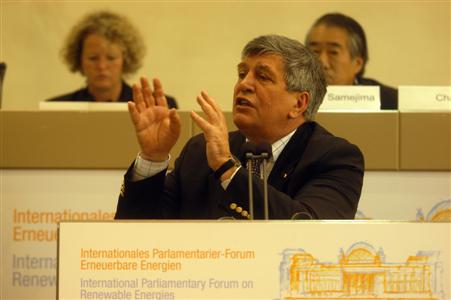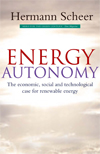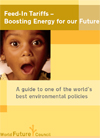 Closing Speech of Dr. Hermann Scheer, Chairman of the International Parliamentary Forum on Renewable Energies, Bonn, June 2nd, 2004
Closing Speech of Dr. Hermann Scheer, Chairman of the International Parliamentary Forum on Renewable Energies, Bonn, June 2nd, 2004We now have ten hours of the International Parliamentary Forum behind us. Around sixty parliamentarians have taken the floor, and we have heard speeches from colleagues from every continent. Paragraph 14 of our Resolution states: "We, the parliamentarians of this International Parliamentary Forum on Renewable Energies, commit to seek to enforce the considerations and recommendations of this resolution in our respective countries. We commit to seek the approval of this resolution in our respective parliaments in order to use the large potential of renewable energies to tackle the challenges humankind is facing."
 Ten years ago, there were virtually no energy policy strategies or energy studies featuring renewables. Renewables were totally underestimated. Indeed, in some cases, they were completely dismissed as a non-option.
Ten years ago, there were virtually no energy policy strategies or energy studies featuring renewables. Renewables were totally underestimated. Indeed, in some cases, they were completely dismissed as a non-option.Even the international organizations failed in this respect. Although the United Nations held a conference on renewables in Nairobi in 1981, it was prompted by the oil crisis of 1973-1982 and the North-South report produced by the Brandt Commission. It was at this point that the call for an International Renewable Energy Agency (IRENA) was voiced for the first time. In Nairobi, the Third World countries called for more intensive efforts in this area; even at this early stage, they were pressing for the establishment of IRENA as well. However, the industrialized countries rejected these demands. They promised that the existing institutions would take on these tasks. As a result, there was even less debate about renewables ten years later than in the 1970s.
Then the United Nations Conference on Environment and Development - the Rio Summit - took place, which adopted the famous Agenda 21. Although there was some debate about the climate issue there, the cause of the climate problem was barely touched upon; nor was there any discussion of the fact that during the oil crisis, Third World debt climbed to 1.2 billion dollars. This should have made it clear, even at this early stage in Rio, how important it is to end the dependency on energy imports and focus instead on domestic energy sources, which are always renewable energies.
Today, many countries have to pay more for their imports of oil than they generate in export revenue. If all the revenue generated by an economy is spent on energy imports, there is no prospect of any development.
However, countries with a current per capita GNP of 10% of the industrialized countries' average still have to pay the same for their energy imports as the developed countries! As a result, the burden on their economies is ten times greater!
We must recognize that renewables do not impose a burden on the economy. In fact, they offer a unique opportunity for the development of all our societies - from North to South, and from East to West. This opportunity is sustainable. It prevents more and more countries from falling into the trap of dependency on increasingly scarce and expensive fossil fuels. Once they have fallen into this trap, the economic dilemma is almost impossible to resolve. It makes energy increasingly unaffordable for more and more people, even those living in wealthy countries, and for entire economies. Indeed, energy is already unaffordable in many countries. These economic factors are, in themselves, sufficient to justify a change in course, even disregarding the environmental problems caused by conventional energies. As all the costs are invested in appropriate technologies, renewable energies - with the exception of bioenergy - are becoming increasingly affordable, whereas the fossil energies are becoming more and more expensive, quite apart from the damage they cause.
The conversion to renewables must be a priority for global economic and political reasons. We should bear in mind that the wars in the Persian Gulf over the last twenty years - the Iran-Iraq war, the 1991 Gulf war, or the Iraq war - would not have happened if the region had contained date plantations instead of oil.
It is essential to overcome the mental block which prevents us from accepting renewables due to their supposed lack of economic viability. From a macroeconomic perspective, major advantages can already be identified in renewables. However, this itself does not substantially benefit the individual investors. Funding programmes must therefore be established at political level. These programmes must transform the macroeconomic benefits into incentives for microeconomic initiatives. This is the most important guideline for strategies to promote renewables.
The developing countries have an urgent need for energy. They are facing a rural-urban exodus.
Their rural regions are becoming increasingly marginalized as they have no access to modern energy systems, whereas their cities are expanding. In many cases, ten million people survive in an infrastructure designed for perhaps one million people, with the result that slums are expanding at a rapid pace. The task is to bring an energy supply to remote rural regions without having to invest heavily in infrastructure or build the necessary systems for conventional energy use. This can only be achieved with renewables: through a decentralized energy supply which links the areas where energy is consumed to the areas in which it is produced. This will revitalize agriculture around the world and kick-start the economic recovery of rural regions. In this way, an alternative model for the future will be introduced, different from the model in place over the last 200 years.
In most of the speeches made at our Forum today, there was a broad consensus in favour of establishing an International Renewable Energy Agency (IRENA) as a means of ending the institutional discrimination against renewables. There is the International Atomic Energy Agency, and the International Energy Agency, the latter being an institution established by the OECD countries to safeguard fossil fuel security. But at present, there is a great gap where the institutional base for renewables should be.
Renewables need an institutional base at international level. They need a point of reference - an agency which provides no-cost advice to the governments and helps them draw up strategies to mobilize renewables. Anyone who considers the existing agencies necessary can no longer seriously deny the need for a renewables agency. It would be a valuable source of support for everyone - especially for non-commercial technology transfer to the countries which are still known as the developing countries today.
Non-commercial technology transfer is the key. Renewables open up opportunities for the developing countries to save their currency reserves, and also offer them the prospect of starting up production of these technologies themselves. This will be encouraged by the new agency. I believe that this will be achieved, even though there is still some degree of resistance to overcome. I am delighted that there is a major consensus on this key issue. I would like to conclude with a quotation from a Polish writer, which may be very relevant to our current situation. He said: »Most people begin far too early to start the important things in life too late.«
When it comes to supplying renewables for the continued development of our global civilization, we must not start too late.
Our Brazilian colleague, Mr Fernando Paulo Gabeira, has already proposed that we hold a second Parliamentary Forum on Renewables in Brazil. The process that we have started today can be relayed around the continents. So I look forward to our next meeting.



